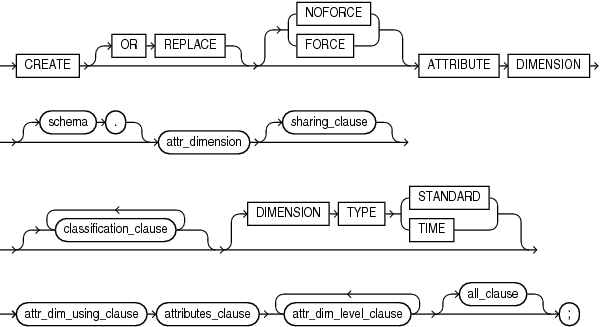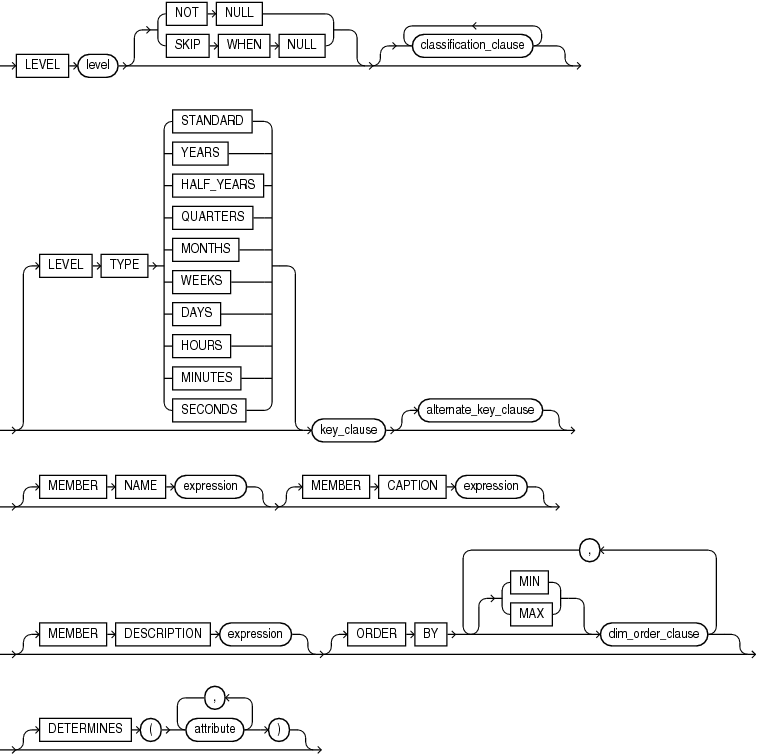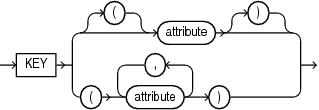CREATE ATTRIBUTE DIMENSION
Purpose
Use the CREATE ATTRIBUTE DIMENSION statement to create an attribute dimension. An attribute dimension specifies dimension members for one or more analytic view hierarchies. It specifies the data source it is using and the members it includes. It specifies levels for its members and determines attribute relationships between levels.
Prerequisites
To create an attribute dimension in your own schema, you must have the CREATE ATTRIBUTE DIMENSION system privilege. To create an attribute dimension in another user's schema, you must have the CREATE ANY ATTRIBUTE DIMENSION system privilege.
Syntax
create_attribute_dimension::=
sharing_clause::=
classification_clause::=
attr_dim_using_clause::=
source_clause::=
attributes_clause::=
attr_dim_attributes_clause::=
attr_dim_level_clause::=
key_clause::=
alternate_key_clause::=
dim_order_clause::=
all_clause::=
Semantics
OR REPLACE
Specify OR REPLACE to replace an existing definition of an attribute dimension with a different definition.
FORCE and NOFORCE
Specify FORCE to force the creation of the attribute dimension even if it does not successfully compile. If you specify NOFORCE, then the attribute dimension must compile successfully, otherwise an error occurs. The default is NOFORCE.
schema
Specify the schema in which to create the attribute dimension. If you do not specify a schema, then Oracle Database creates the attribute dimension in your own schema.
attr_dimension
Specify a name for the attribute dimension.
sharing_clause
Specify whether to create the attribute dimension as an application common object. Specifying METADATA shares the attribute dimension's metadata, but its data is unique to each container. Specifying DATA shares the attribute dimension object; its data is the same for all containers in the application container and the data is stored only in the application root. Specifying NONE excludes the attribute dimension from being shared.
classification_clause
Use the classification clause to specify values for the CAPTION or DESCRIPTION classifications and to specify user-defined classifications. Classifications provide descriptive metadata that applications may use to provide information about analytic views and their components.
You may specify any number of classifications for the same object. A classification can have a maximum length of 4000 bytes.
For the CAPTION and DESCRIPTION classifications, you may use the DDL shortcuts CAPTION 'caption' and DESCRIPTION 'description' or the full classification syntax.
You may vary the classification values by language. To specify a language for the CAPTION or DESCRIPTION classification, you must use the full syntax. If you do not specify a language, then the language value for the classification is NULL. The language value must either be NULL or a valid NLS_LANGUAGE value.
DIMENSION TYPE
An attribute dimension may be either a STANDARD or a TIME type. A STANDARD type attribute dimension has STANDARD type levels. Each level of a TIME type attribute dimension is one of the time types. The default DIMENSION TYPE is STANDARD.
attr_dim_using_clause
Use this clause to declare the sources that you want to use to create the attribute dimension.
source_clause
You may specify the following sources:
-
A table or a view.
-
An alias for the table or the view by using the
ASkeyword. -
A join path. Use join paths to specify joins when the attribute dimension uses tables organized in a snowflake schema.
REMOTE
Specify REMOTE on a given source to indicate that the source is backed by remote data and should be optimized as remote data.
join_path_clause
The join path clause specifies a join condition between columns in different tables. The name for the join path specified by the join_path_name argument must be unique for each join path included in the USING clause.
join_condition
A join condition consists of one or more join condition elements; each additional join condition element is included by an AND operation.
join_condition_element
In a join condition element, the column references on the left-hand-side must come from a different table than the column references on the right-hand-side.
attributes_clause
Specify one or more attr_dim_attribute_clause clauses.
attr_dim_attribute_clause
Specify a column from the attr_dim_using_clause source. The attribute has the name of the column unless you specify an alias using the AS keyword. You may specify classifications for each attribute.
attr_dim_level_clause
Specify a level in the attribute dimension. A level specifies key and optional alternate key attributes that provide the members of the level.
If the key attribute has no NULL values, then you may specify NOT NULL, which is the default. If it does have one or more NULL values, then specify SKIP WHEN NULL.
LEVEL TYPE
A STANDARD type attribute dimension has STANDARD type levels. You do not need to specify a LEVEL TYPE for a STANDARD type attribute dimension.
In a TIME type attribute dimension, you must specify a level type. The type of the level may be one of the time types. You must specify a time type even if the values of the level members are not of that type. For example, you may have a SEASON level with values that are the names of seasons. In defining the level, you must specify any one of the time level types, such as QUARTERS. An application may use the level type designations for whatever purpose it chooses.
DETERMINES
With the DETERMINES keyword, you may specify other attributes of the attribute dimension that this level determines. If an attribute has only one value for each value of another attribute, then the value of the first attribute determines the value of the other attribute. For example, the QUARTER_ID attribute has only one value for each value of the MONTH_ID attribute, so you can include the the QUARTER_ID attribute in the DETERMINES phrase of the MONTHS level.
key_clause
Specify one or more attributes as the key for the level.
alternate_key_clause
Specify one or more attributes as the alternate key for the level.
dim_order_clause
Specify the ordering of the members of the level.
all_clause
Optionally specify MEMBER NAME, MEMBER CAPTION, and MEMBER DESCRIPTION values for the implicit ALL level. By default, the MEMBER NAME value is ALL.
Examples
The following example describes the TIME_DIM table:
desc TIME_DIM
Name Null? Type
----------------- ----- -------------
MONTH_ID VARCHAR2(10)
CATEGORY_ID NUMBER(6)
STATE_PROVINCE_ID VARCHAR2(120)
UNITS NUMBER(6)
SALES NUMBER(12,2)
YEAR_ID NOT NULL VARCHAR2(30)
YEAR_NAME NOT NULL VARCHAR2(40)
YEAR_END_DATE DATE
QUARTER_ID NOT NULL VARCHAR2(30)
QUARTER_NAME NOT NULL VARCHAR2(40)
QUARTER_END_DATE DATE
QUARTER_OF_YEAR NUMBER
MONTH_ID NOT NULL VARCHAR2(30)
MONTH_NAME NOT NULL VARCHAR2(40)
MONTH_END_DATE DATE
MONTH_OF_YEAR NUMBER
MONTH_LONG_NAME VARCHAR2(30)
SEASON VARCHAR2(10)
SEASON_ORDER NUMBER(38)
MONTH_OF_QUARTER NUMBER(38) The following example creates a TIME type attribute dimension, using columns from the TIME_DIM table:
CREATE OR REPLACE ATTRIBUTE DIMENSION time_attr_dim
DIMENSION TYPE TIME
USING time_dim
ATTRIBUTES
(year_id
CLASSIFICATION caption VALUE 'YEAR_ID'
CLASSIFICATION description VALUE 'YEAR ID',
year_name
CLASSIFICATION caption VALUE 'YEAR_NAME'
CLASSIFICATION description VALUE 'Year',
year_end_date
CLASSIFICATION caption VALUE 'YEAR_END_DATE'
CLASSIFICATION description VALUE 'Year End Date',
quarter_id
CLASSIFICATION caption VALUE 'QUARTER_ID'
CLASSIFICATION description VALUE 'QUARTER ID',
quarter_name
CLASSIFICATION caption VALUE 'QUARTER_NAME'
CLASSIFICATION description VALUE 'Quarter',
quarter_end_date
CLASSIFICATION caption VALUE 'QUARTER_END_DATE'
CLASSIFICATION description VALUE 'Quarter End Date',
quarter_of_year
CLASSIFICATION caption VALUE 'QUARTER_OF_YEAR'
CLASSIFICATION description VALUE 'Quarter of Year',
month_id
CLASSIFICATION caption VALUE 'MONTH_ID'
CLASSIFICATION description VALUE 'MONTH ID',
month_name
CLASSIFICATION caption VALUE 'MONTH_NAME'
CLASSIFICATION description VALUE 'Month',
month_long_name
CLASSIFICATION caption VALUE 'MONTH_LONG_NAME'
CLASSIFICATION description VALUE 'Month Long Name',
month_end_date
CLASSIFICATION caption VALUE 'MONTH_END_DATE'
CLASSIFICATION description VALUE 'Month End Date',
month_of_quarter
CLASSIFICATION caption VALUE 'MONTH_OF_QUARTER'
CLASSIFICATION description VALUE 'Month of Quarter',
month_of_year
CLASSIFICATION caption VALUE 'MONTH_OF_YEAR'
CLASSIFICATION description VALUE 'Month of Year',
season
CLASSIFICATION caption VALUE 'SEASON'
CLASSIFICATION description VALUE 'Season',
season_order
CLASSIFICATION caption VALUE 'SEASON_ORDER'
CLASSIFICATION description VALUE 'Season Order')
LEVEL month
LEVEL TYPE MONTHS
CLASSIFICATION caption VALUE 'MONTH'
CLASSIFICATION description VALUE 'Month'
KEY month_id
MEMBER NAME month_name
MEMBER CAPTION month_name
MEMBER DESCRIPTION month_long_name
ORDER BY month_end_date
DETERMINES (month_end_date,
quarter_id,
season,
season_order,
month_of_year,
month_of_quarter)
LEVEL quarter
LEVEL TYPE QUARTERS
CLASSIFICATION caption VALUE 'QUARTER'
CLASSIFICATION description VALUE 'Quarter'
KEY quarter_id
MEMBER NAME quarter_name
MEMBER CAPTION quarter_name
MEMBER DESCRIPTION quarter_name
ORDER BY quarter_end_date
DETERMINES (quarter_end_date,
quarter_of_year,
year_id)
LEVEL year
LEVEL TYPE YEARS
CLASSIFICATION caption VALUE 'YEAR'
CLASSIFICATION description VALUE 'Year'
KEY year_id
MEMBER NAME year_name
MEMBER CAPTION year_name
MEMBER DESCRIPTION year_name
ORDER BY year_end_date
DETERMINES (year_end_date)
LEVEL season
LEVEL TYPE QUARTERS
CLASSIFICATION caption VALUE 'SEASON'
CLASSIFICATION description VALUE 'Season'
KEY season
MEMBER NAME season
MEMBER CAPTION season
MEMBER DESCRIPTION season
LEVEL month_of_quarter
LEVEL TYPE MONTHS
CLASSIFICATION caption VALUE 'MONTH_OF_QUARTER'
CLASSIFICATION description VALUE 'Month of Quarter'
KEY month_of_quarter;The following example describes the PRODUCT_DIM table:
desc PRODUCT_DIM
Name Null? Type
--------------- -------- -------------
DEPARTMENT_ID NOT NULL NUMBER
DEPARTMENT_NAME NOT NULL VARCHAR2(100)
CATEGORY_ID NOT NULL NUMBER
CATEGORY_NAME NOT NULL VARCHAR2(100)The following example creates a STANDARD type attribute dimension, using columns from the PRODUCT_DIM table:
CREATE OR REPLACE ATTRIBUTE DIMENSION product_attr_dim
USING product_dim
ATTRIBUTES
(department_id,
department_name,
category_id,
category_name)
LEVEL DEPARTMENT
KEY department_id
ALTERNATE KEY department_name
MEMBER NAME department_name
MEMBER CAPTION department_name
ORDER BY department_name
LEVEL CATEGORY
KEY category_id
ALTERNATE KEY category_name
MEMBER NAME category_name
MEMBER CAPTION category_name
ORDER BY category_name
DETERMINES(department_id)
ALL MEMBER NAME 'ALL PRODUCTS';The following example describes the GEOGRAPHY_DIM table:
desc GEOGRAPHY_DIM
Name Null? Type
--------------- -------- -------------
DEPARTMENT_ID NOT NULL NUMBER
DEPARTMENT_NAME NOT NULL VARCHAR2(100)
CATEGORY_ID NOT NULL NUMBER
CATEGORY_NAME NOT NULL VARCHAR2(100)
REGION_ID NOT NULL VARCHAR2(120)
REGION_NAME NOT NULL VARCHAR2(100)
COUNTRY_ID NOT NULL VARCHAR2(2)
COUNTRY_NAME NOT NULL VARCHAR2(120)
STATE_PROVINCE_ID NOT NULL VARCHAR2(120)
STATE_PROVINCE_NAME NOT NULL VARCHAR2(400)The following example creates an STANDARD type attribute dimension, using columns from the GEOGRAPHY_DIM table:
CREATE OR REPLACE ATTRIBUTE DIMENSION geography_attr_dim
USING geography_dim
ATTRIBUTES
(region_id,
region_name,
country_id,
country_name,
state_province_id,
state_province_name)
LEVEL REGION
KEY region_id
ALTERNATE KEY region_name
MEMBER NAME region_name
MEMBER CAPTION region_name
ORDER BY region_name
LEVEL COUNTRY
KEY country_id
ALTERNATE KEY country_name
MEMBER NAME country_name
MEMBER CAPTION country_name
ORDER BY country_name
DETERMINES(region_id)
LEVEL STATE_PROVINCE
KEY state_province_id
ALTERNATE KEY state_province_name
MEMBER NAME state_province_name
MEMBER CAPTION state_province_name
ORDER BY state_province_name
DETERMINES(country_id)
ALL MEMBER NAME 'ALL CUSTOMERS';













